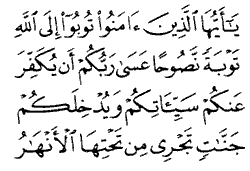Turning, Emergence, Ego
Issue 797 » July 4, 2014 - Ramadan 7, 1435
Living The Quran
Turning
Al-Tahrim (The Prohibition) - Chapter 66: Verse 8 (partial)
 "O believers, turn (tubu) unto God in sincere repentance (tawbatan nasuhan). It may be that you Lord will remit from you your evil deeds and let you enter gardens with rivers flowing underneath ..."
"O believers, turn (tubu) unto God in sincere repentance (tawbatan nasuhan). It may be that you Lord will remit from you your evil deeds and let you enter gardens with rivers flowing underneath ..."
God's limitless goodness and grace extend even to those faithless who have fallen into the temptation to commit the most heinous sin against God, the sin of idolatry, provided that they repent of their evil ways and return to the faith.
So all believers are strongly enjoined to turn to God in sincere repentance. It may be that God will forgive them their previous sins, committed consciously or unconsciously. A truly repentant heart merits even the reward of Paradise.
Throughout the Quran it is constantly emphasized that 'God turns (yatubu, from the same root as tawbah) towards who He will. It is interesting to observe that the same word tawbah, means 'repentance' on the part of man, and 'forgiveness' on the part of God. Man 'turns' towards God in repentance, and God 'turns' towards man with His grace. There is clearly a correlative relationship of 'turning' between God and man, and this is reflected in the semantic behaviour of the word tawbah.
The emphatic form from the same root, tawwab is also used very often. When applied to a man, it means 'one who repents very often'; when applied to God, it naturally means 'He Who is wont to turn to sinners in forgiveness, Who reverts very often from wrath to grace.'
Compiled From:
"Ethico Religious Concepts in the Quran" - Toshihiko Izutsu, pp. 110, 111
Understanding The Prophet's Life
Emergence
The month of Ramadan is a special time for purifying oneself, the greatest opportunity to implement the discussions and cures with regard to the heart. In fact, this is the purpose, blessing, and secret of the month. It is a remarkable event when the new moon of Ramadan is sighted, when eyes aim toward the horizon shortly after sunset and wait until suddenly a small sliver appears. Qadi Abu Bakr ibn al-Arabi said in his commentary that the secret of Muslims following a lunar calendar as opposed to a solar calendar is that the sun is used for worldly benefits while the moon is used for other-worldly benefits. Witnessing the new moon is seeing emergence, as it is known in philosophy. The crescent suddenly emerges in the sky seemingly out of nothing. The reason the moon is not visible at first is because the sunlight is too strong. But as sunset progresses, the light diminishes on the horizon and the sunlight against the crescent itself becomes distinguished from the surrounding crimson sky. So what we actually see of the moon is the sun's light reflected against the lunar sliver. In fact, anything that we see in creation is due to reflected light. And all light comes from God. Witnessing the birth of the new moon is pregnant with metaphor. The word hilal (crescent) is closely related to an Arabic word that refers to birth (istihlal). So what we see is actually the birth of reflected light.
Witnessing the emergence of the new moon is a movement from ilm al-yaqin (sure knowledge) to ayn al-yaqin (direct sure knowledge). The former corresponds to hearing a report from another, instead of witnessing the event in person. It is related by Imam al-Hakim that the Prophet (peace be upon him) said, "The best of God's servants are those who are vigilant about the new moon and shadows to determine the prayer times, as a way of remembering God."
Compiled From:
"Purification of the Heart" - Hamza Yusuf, pp. 184, 185
Blindspot!
Ego
The Self wishes to create, to evolve. The Ego likes things just the way they are.
The Ego is that part of the psyche that believes in material existence.
The Ego's job is to take care of business in the real world. It's an important job. We couldn't last a day without it. But there are worlds other than the real world, and this is where the Ego runs into trouble.
Here's what the Ego believes:
1. Death is real. The Ego believes that our existence is definitely by our physical flesh. When the body dies, we die. There is no life beyond life.
2. Time and space are real. The Ego is analog. It believes that to get from A to Z we have to pass through B, C, and D. To get from breakfast to supper we have to live the whole day.
3. Every individual is different and separate from every other. The Ego believes that I am distinct from you. The twain cannot meet. I can hurt you and it won't hurt me.
4. The predominant impulse of life is self-preservation. Because our existence is physical and thus vulnerable to innumerable evils, we live and act out of fear in all we do. It is wise, the Ego believes, to have children to carry on our line when we die, to achieve great things that will live after us, and to buckle our seat belts.
5. There is no God. No sphere exists except the physical and no rules apply except those of the material world.
Compiled From:
"The War of Art" - Steven Pressfield, pp. 136, 137